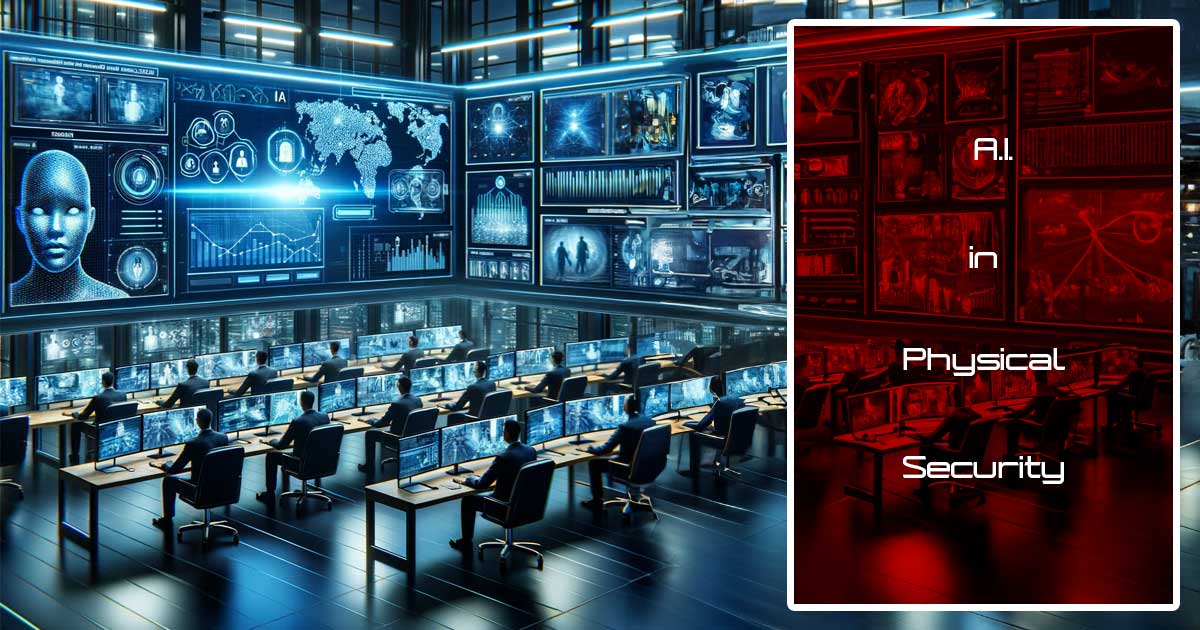In an era where security challenges are increasingly complex, the integration of AI in physical security has become a pivotal strategy for modern businesses. This approach not only elevates safety protocols but also aligns with the growing necessity for advanced security solutions in today’s dynamic risk landscape.
The Current State of Physical Security and AI Adoption
Recent findings from Pro-Vigil’s survey reveal a startling gap: a significant 71% of businesses have yet to incorporate AI into their physical security plans, despite escalating security incidents. The slow adoption rate of AI technologies in security strategies reflects a broader hesitation, potentially stemming from a lack of awareness or understanding of the benefits AI can bring to physical security (Pro-Vigil, 2024).
Real-World Challenges and AI Solutions
- Automated Surveillance and Analysis: AI can analyze surveillance footage in real-time, identifying potential threats more efficiently than human monitoring. For instance, AI algorithms can detect unusual behaviors or unauthorized access, triggering alerts for immediate action (Security Magazine, 2023).
- Predictive Threat Analysis: By analyzing historical data, AI can predict potential security breaches, allowing businesses to proactively address vulnerabilities before they are exploited.
- Facial Recognition and Access Control: AI-enhanced facial recognition systems can significantly improve access control, ensuring that only authorized personnel can enter sensitive areas (Security Magazine, 2023).
- Intelligent Response Systems: In the event of a security breach, AI can guide emergency responses, providing critical information to security personnel and first responders (Pro-Vigil, 2024).
The Human Element in AI-Enhanced Security
While AI brings numerous advantages, the human element remains crucial. Training staff to understand and interact with AI systems ensures that technology complements human skills, rather than replacing them. This includes regular training sessions and drills to keep staff updated on the latest AI security technologies and protocols (Security Magazine, 2023).
Addressing Privacy and Ethical Concerns
Integrating AI in physical security raises valid concerns about privacy and ethics. It’s essential for businesses to establish clear policies on data usage, storage, and privacy, ensuring compliance with regulations like GDPR and others. Transparency with employees and customers about how AI is used in security systems can build trust and demonstrate a commitment to ethical practices (Pro-Vigil, 2024).
Looking Ahead: The Future of AI in Physical Security
The horizon for AI in physical security is not just expanding; it’s being redefined with every technological advancement. As we edge closer to a future where AI’s capabilities are intertwined with every aspect of physical security, it’s becoming evident that the role of artificial intelligence will not just grow—it will become central to how businesses protect their assets, employees, and customers.
The potential of AI to transform physical security is vast and varied. From real-time surveillance with advanced analytics to predictive threat modeling that can forecast security breaches before they occur, AI is at the forefront of revolutionizing safety measures. Businesses that are proactive in integrating AI into their security protocols are not merely enhancing their current systems; they are taking a giant leap towards future-proofing their operations against an increasingly unpredictable threat landscape.
Investing in AI technologies for physical security is becoming an indispensable strategy for modern businesses. This forward-thinking approach not only bolsters current defense mechanisms but also ensures agility and adaptability in the face of evolving security challenges. The dynamic nature of AI, with its ability to learn and adapt, means that security systems can become more intelligent and efficient, capable of identifying and neutralizing threats with unprecedented precision.
Moreover, the role of AI in enhancing the decision-making capabilities of security personnel cannot be overstated. By providing actionable insights and real-time data, AI enables security teams to respond to incidents with greater speed and accuracy. This synergy between human intuition and AI-driven analytics is setting a new standard for security operations, ensuring that responses are not just swift but also strategically informed.
As we look to the future, the integration of AI in physical security is poised to open new avenues for innovation. From autonomous security drones patrolling perimeters to smart access control systems that can identify individuals through biometric data, the possibilities are limitless. These advancements promise not only to enhance the effectiveness of security measures but also to create a more seamless and unobtrusive security experience for individuals.
However, with great power comes great responsibility. The adoption of AI in physical security raises important ethical and privacy considerations. Ensuring that AI systems are designed and implemented with respect for individual rights and compliance with legal standards is paramount. Businesses must navigate these challenges with transparency and integrity, fostering trust and demonstrating their commitment to ethical practices.
The future of AI in physical security is not just about adopting new technologies; it’s about embracing a paradigm shift towards more intelligent, responsive, and ethical security practices. As we move forward, the businesses that recognize the transformative potential of AI and invest in its integration will be the ones leading the way in creating safer, more secure environments for all.
Embrace AI with Grab The Axe
The journey to leveraging AI in Security Innovation begins with understanding its potential and implementing it with precision. Schedule a security assessment with Grab The Axe today to explore how AI can revolutionize your security strategy, ensuring your organization stays protected in the digital age.
References
- Pro-Vigil. (2024). “The State of Physical Security Entering 2024.” Retrieved from Pro-Vigil’s website.
- Security Magazine. (2023). “Security’s Year in Review – 2023.” Retrieved from Security Magazine’s website.
To Learn More:
Transformative Physical Security Assessment: A Case Study for Retailers
Security Technology Updates in Phoenix: Navigating the Future of Community Safety





Pingback: Essential Guide to Physical Security Assessment for Businesses: Top 10 FAQs Answered - Grab The Axe
Pingback: Digital Age Physical Security: Integrating Digital and Traditional Defenses - Grab The Axe
Pingback: AI in Security Innovation: Revolutionize Protection - Grab The Axe